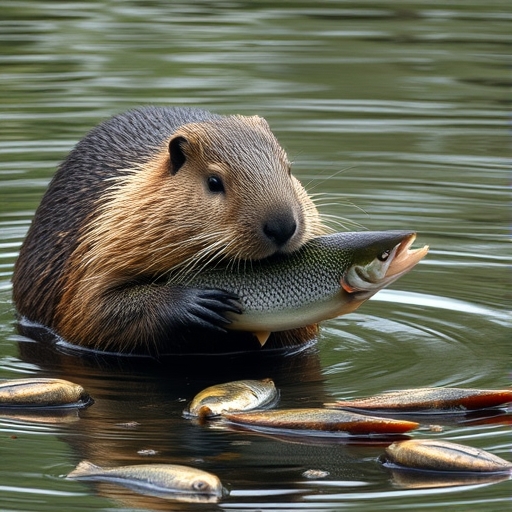The beaver ( Castor canadensis in North America and Castor fiber in Eurasia), a keystone species renowned for its dam-building prowess and transformative impact on its environment, often sparks curiosity regarding its dietary habits. While popular imagination might conjure images of beavers actively hunting and consuming fish, the reality is far more nuanced. This article delves into the beaver’s diet, exploring the misconception surrounding fish consumption and highlighting the true nature of their omnivorous lifestyle.
The Primarily Herbivorous Nature of Beavers
Beavers are primarily herbivores, meaning their diet consists largely of plant material. Their powerful incisors, constantly growing to compensate for wear, are perfectly adapted for gnawing through tough woody vegetation. This diet forms the cornerstone of their energy intake and nutritional needs.
Key Components of a Beaver’s Plant-Based Diet:
Woody plants: Bark, twigs, and branches of various deciduous trees and shrubs make up the bulk of a beaver’s diet, particularly in winter. Preferred species vary geographically but often include aspen, willow, birch, poplar, and alder. The inner bark (cambium) is particularly nutritious.
Aquatic plants: During warmer months, beavers supplement their diet with a variety of aquatic plants such as water lilies, pondweeds, and reeds. These provide a source of readily available nutrients and moisture.
Herbaceous plants: In addition to woody and aquatic plants, beavers will consume various herbs, grasses, and forbs, especially during the growing season. This diversification adds crucial vitamins and minerals to their diet.
The Role of Occasional Omnivory
While overwhelmingly herbivorous, beavers exhibit opportunistic omnivory. This means they might occasionally supplement their primarily plant-based diet with other food sources, including animal matter. However, this is not a regular or significant part of their diet.
Instances of Animal Consumption:
Insects and invertebrates: Beavers are known to consume aquatic insects, snails, and other invertebrates found in and around their ponds. These are often consumed incidentally while foraging for aquatic plants. The nutritional value is relatively low compared to plant material.
Carrion: Beavers might occasionally scavenge carrion, consuming dead animals they find. This behavior is opportunistic and infrequent, driven primarily by the availability of easy-to-access food rather than an active hunting strategy.
Fish – A Rare Occurrence: While anecdotal accounts exist of beavers consuming fish, it’s crucial to emphasize that this is extremely rare and not a characteristic part of their feeding behavior. Their physical adaptations and digestive systems are not suited to regularly hunting and consuming fish. They lack the sharp teeth, claws, and hunting instincts typical of fish-eating predators.
Dispelling the Myth: Why Beavers Don’t Regularly Eat Fish
The misconception of beavers as fish-eaters likely stems from several factors:
Habitat overlap: Beavers and fish share aquatic habitats, leading to the assumption of a predator-prey relationship.
Observational bias: Isolated incidents of beaver predation on fish might be magnified, creating a false impression of widespread behavior. It’s important to remember that exceptional cases don’t define the norm.
Lack of direct observation: Beavers are often nocturnal and secretive, making comprehensive dietary studies challenging. This leaves room for speculation and unsubstantiated claims.
Scientific studies consistently demonstrate that the vast majority of a beaver’s diet comes from plant material. Their physiology and behavior support this primarily herbivorous lifestyle.
The Beaver’s Digestive System: Designed for Plants
A beaver’s digestive system is uniquely adapted for processing cellulose-rich plant matter. Their large cecum (a part of the large intestine) houses a rich microbial flora that helps break down tough plant fibers, extracting essential nutrients. This digestive system is not equipped to efficiently process the high protein and fat content of a fish-based diet.
Impact on Aquatic Ecosystems: The Beaver’s Role Beyond Diet
The significance of beavers lies not only in their diet but also in their transformative influence on aquatic ecosystems. Their dam-building activities create wetlands, increasing biodiversity and providing habitat for a wide range of species, including fish. The ponds they create offer calmer waters, ideal spawning grounds for various fish species. This positive impact underscores the beaver’s role as a keystone species.
Comparison Table: Beaver Diet vs. Fish-Eating Mammal Diet
To highlight the difference, let’s compare a beaver’s diet with that of a known fish-eating mammal, the otter:
| Feature | Beaver | Otter |
|---|---|---|
| Primary Diet | Herbivorous (woody plants, aquatic plants) | Carnivorous (fish, crustaceans, amphibians) |
| Teeth | Strong, ever-growing incisors for gnawing | Sharp teeth for gripping and tearing prey |
| Hunting Behavior | No active hunting of fish | Active hunting and pursuit of prey |
| Digestive System | Adapted for cellulose digestion | Adapted for protein and fat digestion |
| Occasional Omnivory | Yes, but infrequent and incidental | No significant herbivory |
FAQ: Addressing Common Questions about Beaver Diets
Q: Have you ever seen a beaver eat a fish?
A: While anecdotal evidence exists, it’s important to interpret such instances carefully. Isolated events do not define the typical dietary habits of beavers. Scientific studies strongly support a predominantly herbivorous diet.
Q: Could a beaver survive on a fish-only diet?
A: Highly unlikely. Their digestive system is not designed to efficiently process the high protein and fat content of fish. They lack the necessary adaptations for successful fish hunting.
Q: Do beavers prey on fish to protect their dams?
A: There is no evidence to suggest beavers actively hunt fish for dam protection. Any consumption of fish would be incidental and opportunistic, not a targeted defense mechanism.
Q: What would happen if a beaver did* eat a lot of fish?
A: It’s likely they would experience digestive issues due to their specialized system not being equipped to handle a fish-based diet effectively. Nutrient deficiencies could also arise from the lack of essential plant-based nutrients.
In conclusion, while beavers are capable of consuming small amounts of animal matter occasionally, their diet is overwhelmingly herbivorous. The idea of beavers as regular fish-eaters is a misconception. Their ecological importance, however, extends far beyond their dietary choices; their dam-building activities significantly shape aquatic ecosystems, benefiting many species, including fish, in the long run. Further research continues to refine our understanding of beaver ecology, but the evidence overwhelmingly points to a predominantly plant-based diet.





